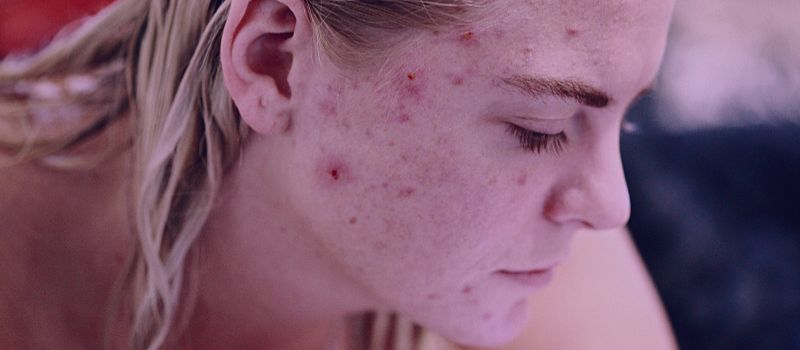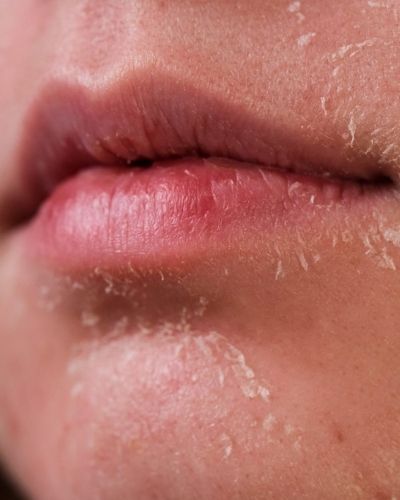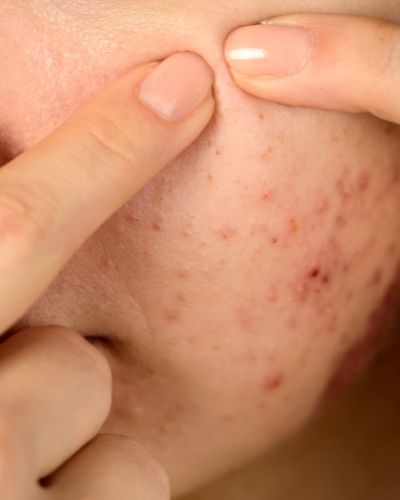There is a lot of debate surrounding Accutane and hormonal acne. Some people swear by the drug, while others say it only worsens the problem.
So, what’s the truth? Is Accutane good for hormonal acne?
In this article, we will take a look at isotretinoin and hormonal acne and try to answer this question once and for all.

Is Accutane Good for Hormonal Acne?
Accutane is a medication that’s usually prescribed when other treatments fail to improve or thoroughly treat severe acne.
The drug is a form of vitamin A, and it works by shrinking the oil-producing glands, thus reducing the amount of oil your skin produces.
It also helps prevent dead skin cells from clogging your pores and causing more inflammation.
Therefore, due to these two functions, Accutane can help treat severe acne, even if the issue is hormonal; however, it won’t fix your hormones.
Hormones are tricky, and unfortunately, there is no magic pill that will fix them.
If you suspect that your acne is hormonal, the best thing to do is consult with a doctor on the best way to balance them and bring their levels to be normal.
There are multiple tests that you can get to figure out if your hormones are imbalanced and thus the root of your acne.
Once you know whether your acne is indeed hormonal, you and your doctor can work on a treatment plan that will be most effective for you.
RELATED: Does Accutane Cause Weight Gain?
What Are The Side Effects of Taking Accutane?

Accutane is a powerful medication that comes with a few potential side effects, some of which are more common than others.
The most common side effects of taking Accutane include:
- Dry skin.
- Itching.
- Peeling.
- Sun sensitivity and sunburns.
- Headaches.
- Mood swings.
Other, more intense but less common side effects of taking Accutane include:
- Nose bleeds due to severely dry and chapped skin.
- Joint pain.
- Stomach ache.
- Hair loss.
- Blurry vision.
- Severe mood swings.
And although these seem scary, it’s also important to note that most people don’t experience any intense side effects besides dry skin that’s more sensitive to the sun while taking Accutane.
However, it’s important to be aware of the potential risks associated with the medication before you start taking it.
If you experience any of these side effects, make sure to talk to your doctor right away.
Will Hormonal Acne Come Back After Accutane?
Suppose your acne proves to be hormonal or caused by something like food intolerance (which is often the cause of hormonal imbalances). In that case, your acne will likely return even after Accutane unless you figure out the trigger and address it adequately.
You could do this by figuring out how to balance your hormones or removing a potential food allergen from your diet.
However, those dealing with severe hormonal imbalances that are triggering their acne will likely see the condition resurface even after Accutane.
As I already mentioned above, Accutane will help get rid of acne while you’re taking it, but it won’t fix your hormones.
Can Hormonal Acne be Maintained?

Yes, hormonal acne can be maintained.
The ideal thing to do is find a way to balance your hormones, either through making diet or lifestyle changes or undergoing a course of certain hormone-balancing medications.
However, you may very well maintain hormonal acne with a great skincare regimen, using the right products for your skin and particular skin needs, and getting regular professional treatments.
There’s no one-size-fits-all answer to this question, as everyone’s skin is different and will respond to different things.
You’ll likely have to experiment to figure out what works best for you or visit a professional such as an esthetician to help you maintain the external portion of this inflammatory condition.
How to Treat Hormonal Acne
Treating hormonal acne doesn’t come without its challenges. You will likely need a lot of patience, dedication, and making the right choices for your skin and yourself.
There’s no magic pill that will immediately eliminate hormonal acne, but there are ways to manage it and help your skin heal.
Here are a few good ways to start with:
Have a Good Skincare Regimen
This one is a no-brainer, but it’s worth repeating. A good skincare routine is essential for keeping your skin healthy and clear.
Make sure you’re using the right products for your skin type and skin concern, but you don’t have to make your routine super complicated and confusing to follow.
Start by:
- Cleansing your face twice a day with a gentle, non-drying cleanser.
- Exfoliating with a gentle, non-irritating exfoliator 2-3 times a week to keep your pores clear and prevent breakouts.
- Using a lightweight, non-comedogenic moisturizer to hydrate your skin and prevent it from becoming dry and irritated.
- Applying sunscreen to protect your skin from UV damage.
Get Professional Treatments
Even if your acne is hormonal, professional treatments such as chemical peels, enzyme therapy, high frequency, and IPL can be beneficial in keeping your skin clear.
Talk to your esthetician about what might work best for you, depending on your location, services provided by your professional, and your budget, but don’t hesitate to get regular facials, as these can truly do wonders for your skin besides keeping acne in check.
RELATED: How To Repair Skin Damage From Acne?
Check Your Diet
Your diet plays a significant role in your hormonal health, so it’s important to make sure you’re eating the right foods and avoiding trigger foods that might worsen your acne.
A few good things to include in your diet are:
- Healthy fats such as avocados, olive oil, nuts, and seeds.
- Plenty of fresh fruits and vegetables.
- Lean protein sources such as poultry, beef, whole eggs, pork tenderloin, fish, tofu, and legumes.
- Foods rich in zinc such as oysters, crab, lobster, red meat, poultry, beans, pumpkin seeds, and dark chocolate.
Additionally, avoiding dairy, sugar, spicy food, and gluten can also be helpful for some people with hormonal acne, as these are known inflammation triggers.
It’s worth noting that avoiding certain foods might not work for everyone, but it’s definitely worth trying if you haven’t already.
Personally, I never understood the connection between sugar and acne, but through doing my own research and experimenting with different foods, I realized that avoiding it definitely helped me, while reintroducing it back into my diet prompted my pimples to come back.
If you think your diet might be triggering your breakouts, talk to a registered dietitian or nutritionist to help you figure out what changes to make.
Or, start experimenting with your food while doing your own research by reading articles from trusted sources such as NCBI, BMC, Science Direct, MDPI, etc.
RELATED: Does Spicy Food Cause Acne?
Change Your Lifestyle and Daily Habits
This one is easier said than done, but making some lifestyle changes can go a long way in keeping your skin clear and acne-free.
Try to:
- Reduce stress by taking breaks throughout the day, meditating, practicing mindfulness, and getting enough sleep.
- Exercise regularly to improve your circulation and lymphatic system and help balance your hormones.
- Wash your face immediately after sweating to prevent bacteria from clogging your pores.
- Don’t pick at or pop your pimples, as this will only make them worse and leave permanent scarring.
RELATED: Why Does Stress Cause Acne?

My name is Simone and I am a certified skin specialist. I created this website to teach my readers how to take great care of their skin and I also like to occasionally share my honest opinions on skincare products I’ve tried. You can learn more about me here.
